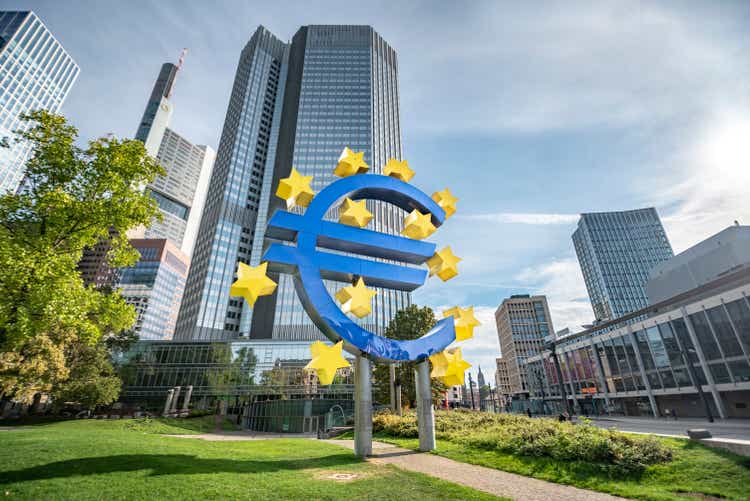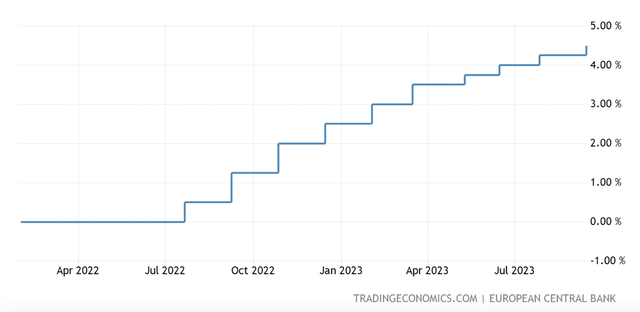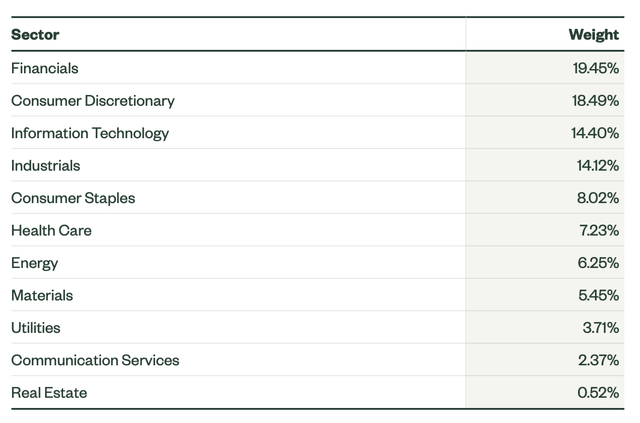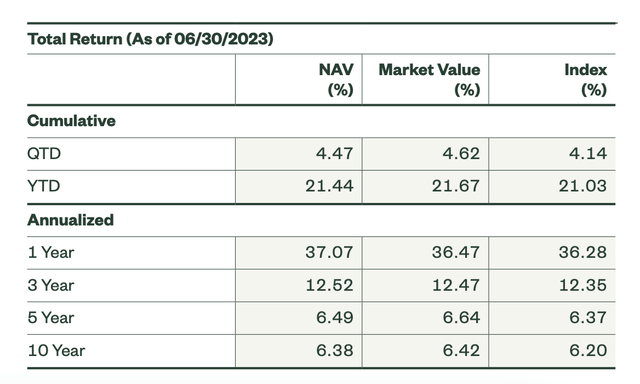FEZ: What To Buy Now As ECB Hikes Interest Rates To Record Highs
Summary
- The European Central Bank has raised key interest rates for the tenth consecutive time in an effort to fight inflation. It also updated forecasts, which slash 2024 growth by 50bps.
- With rates likely to stay elevated until inflation comes off to the ECB's target levels, the economy can stay uncertain over the next year.
- Index trackers like the SPDR Euro Stoxx 50 ETF can make good buys right now, as they are diversified and have high-quality holdings.

Stephan Behnes
In a continued bid to fight inflation, the European Central Bank [ECB] raised key interest rates for the tenth consecutive time earlier today, saying that inflation is “still expected to stay too high for too long”. Inflation in the eurozone is at 5.3% year-on-year (YoY) as per the latest reading.
The latest 25 basis points increase, now means that the rate for the main refinancing operations is at 4.5% and those for its marginal lending and deposit facility are at 4.75% and 4%, respectively. Significant as monetary tightening is to maintain price stability, it comes at a cost.

Rising Interest Rates (Source: Trading Economics)
The cost of higher interest rates
The cost, of course, is growth. Here’s why. Along with the interest rate decision, the bank also updated its forecasts for both inflation and growth for up to 2025 (see table below).
The biggest change is in growth expectations for 2024, which have been slashed to 1% from 1.5% earlier. This means, that the economy will now touch trend growth of 1.2%, the average growth over the past five years, only in 2025. This is also the time when inflation will finally get near the ECB’s target rate.

Source: ECB
The silver lining
Interestingly, though, key European stock markets showed no adverse reaction, with the German DAX and the French CAC 40 actually up by 1% and 1.2%. This might have something to do with the possibility of a pause in rates, based on the following statement:
Based on its current assessment, the Governing Council considers that the key ECB interest rates have reached levels that, maintained for a sufficiently long duration, will make a substantial contribution to the timely return of inflation to the target.
Whichever way we look at it, though, the fact remains that interest rates are not at a record high and are expected to stay there for the foreseeable future.
The investing challenge
With the ECB most unlikely to step in if growth drops, it means we are now looking at over a year of macroeconomic trends that are both beneficial and challenging. Beneficial because of the softening in inflation and challenging because of a slowing down of growth. This is a potentially tricky situation from a stock investing perspective.
A come-off in inflation is a positive sign for margins. As I mentioned in the case of iShares Core High Dividend ETF (HDV), five of its top 10 holdings had reported an expansion in operating margin in the latest quarter. Energy companies were the ones that didn’t join in on this trend, for the reason of a decline in energy prices.
On the other hand, the growth slowdown is also visible in a come-off in sales growth across companies. A case in point is the French luxury company LVMH (OTCPK:LVMUY), which has sustained growth recently partly because of its European market, besides the return of growth from China. With softening in the US market already visible, a drop in European sales can affect it going forward.
Where to invest now
Rather than picking single stocks at this time, a good investment could be in an ETF like the SPDR Euro Stoxx 50 ETF (NYSEARCA:FEZ) instead. As the name suggests, it tracks the performance of the Euro Stoxx 50 index (SX5E), which represents the performance of the biggest 50 stocks in the eurozone by market capitalisation [MCap].
High-quality and diversified
While it’s entirely possible that the index itself could weaken if the economic conditions start looking more uncertain than predicted, it does have its advantages. The first is that an investment in blue chip stocks is a safer bet at this time than others. Next, it’s dispersed across sectors, with financials, consumer discretionary, information technology and industrials all of which have an over 10% weight in the fund (see table below).

Source: SPDR Euro Stoxx 50 ETF
Encouraging returns
Its performance over the past year is notable with a 27.4% rise, and it was strong even until the first half of this year (see table below), though it has slowed down since with year-to-date [YTD] price returns at 11.4%. The annualised three-year returns at the end of the last quarter also look quite decent (see table below).

Source: SPDR Euro Stoxx 50 ETF
Dividend consistency
FEZ’s dividend yield at 3.3% is decent too and there’s something to say for the fact that it has consistently paid dividends for the past 15 years. Also, while its dividend amounts have fluctuated from year to year, over the past five years, they have seen a compounded annual growth rate of 2.6%. In fact, the number has jumped to 32.4% over the past three years.
The risk
It’s not without its risks, though, with financials making up for 19.5% of its holdings. As a cyclical sector, it could be vulnerable to a slowdown. Also, its biggest holdings like the Dutch semiconductor equipment provider ASML Holdings (ASML), the French luxury company LVMH and TotalEnergies (TTE) all have significant exposure to the US market as well. While the US economy has defied the recession so far, there are still risks ahead.
Overall though, the fund looks like a good investment to make decent returns and with its exposure to sectors like health care and utilities, can also provide stability.
What next?
The key takeaway from the ECB’s monetary policy statement from the investing perspective, is that interest rate hikes might hit a pause, but they will stay elevated. This is good news on the inflation front but growth is expected to suffer this year and the next.
There is both an investing opportunity and a challenge for investors in this scenario. While declining inflation can indicate better margins, a weak economy can slow down sales growth. Since it can be an uncertain time, a good idea could be to invest in a broad-based ETF instead of single stocks.
FEZ is one option, which tracks the Euro Stoxx 50 index, gives stability from investing in the biggest companies and is also diversified across sectors. It’s performance YTD is good too, and has a decent dividend yield as well. While it has its own risks, including exposure to cyclical sectors as well as the US economy, which could face its own challenges later this year or the next, overall, it still looks like a good option.
Editor's Note: This article discusses one or more securities that do not trade on a major U.S. exchange. Please be aware of the risks associated with these stocks.
--
This article was written by
Manika is an investment researcher and writer as well as a macroeconomist, with a focus on converting big-picture trends into actionable investment ideas. She has worked in investment management, stock broking and investment banking. As an entrepreneur, running her own research firm, she received the Goldman Sachs 10,000 Women scholarship for certification in business. She is also a public speaker, having shared her views at multiple international forums and has been quoted in leading international media.
Analyst’s Disclosure: I/we have no stock, option or similar derivative position in any of the companies mentioned, but may initiate a beneficial Long position through a purchase of the stock, or the purchase of call options or similar derivatives in FEZ over the next 72 hours. I wrote this article myself, and it expresses my own opinions. I am not receiving compensation for it (other than from Seeking Alpha). I have no business relationship with any company whose stock is mentioned in this article.
Seeking Alpha's Disclosure: Past performance is no guarantee of future results. No recommendation or advice is being given as to whether any investment is suitable for a particular investor. Any views or opinions expressed above may not reflect those of Seeking Alpha as a whole. Seeking Alpha is not a licensed securities dealer, broker or US investment adviser or investment bank. Our analysts are third party authors that include both professional investors and individual investors who may not be licensed or certified by any institute or regulatory body.

